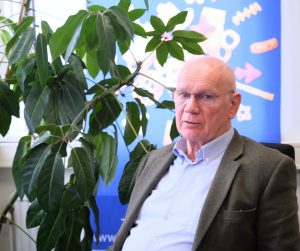28th of October 2024
On the occasion of his retirement, Mr. Hendrik Jan Mekelenkamp shares some interesting thoughts about his career and the snack industry.

photo by Monika van Miltenburg
- Tell us about your work history, starting with the first job.
I began my professional career at Stork (now Marel) in the poultry processing world. It was an internal service position and my biggest fear was having a static office job. I was dreaming of traveling the world and meeting new people so I decided to find a better match for me. This was when I first came across Lalesse. At that time, Lalesse was a much different organisation than it is now, not only in terms of culture but also in the solutions offered to its clients. I felt like my potential was not truly fulfilled so, after two years I joined Florigo (now TNA), only a short time after Mr. Jan Kuipers left (the founder of Kuipers Food Processing Machinery, a company which currently owns Lalesse). Before returning to Lalesse again, I worked for some years with Van de Pol and Rademakers, also in the processing industry. I found baking not to be my process, so I was on the lookout again. This is where Lalesse came back onto my path. The job advertised this time was a perfect fit until the management buyout, for me also an exit. The buyout eventually led to bankruptcy. In 2006, Lalesse was acquired by Ottervanger (together with me) with the intention of using its technology for pet food production. It was soon found that Lalesse’s extruders were not fit for this purpose so its main focus had to go back on snacks.
In 2009 I took over Lalesse and have been its owner since this year when Kuipers acquired it. During the last years Luc Jan Wolpert became co-owner.
- What do you feel were your greatest career accomplishments?
In the past Lalesse sold over 40 extruders in the UK for the production of Wotsits snacks (number one snack in the UK market). When I told people in a pub in Manchester that I was involved in the production of this snack, they treated me like a celebrity. A frame was made and they requested to put my signature as well, the paper that read: I met the man who makes the Wotsits machines!
The paper has been on the pub wall since.
- At what moment of your career did you enjoy work the most?
Early in 2005, when I rejoined Lalesse and then took it over. It was very exciting. We came up with a daring new design, an extruder through the eyes of a designer. It resulted in a very busy exhibition in Barcelona that year. We really had the eye catcher!
- What did you wish to become as a child?
When I was six, I already knew I wanted to be an engineer but also travel a lot. This is why initially, I tried to be a pilot and then studied flight engineering which became a computerised job. While studying, I already took the opportunity to travel and gain some international experience in Japan and South Africa.
- Did you ever have a mentor?
My bank manager I consider a mentor of sorts. He was the one who believe in me and gave me a loan although he did not understand well what was it that I wanted to do. Ten years later he came to congratulate me on my success.
- What do you feel is more important, education or success?
Although experience is key, I think it is education that gives you a base and if I look into the future, experience is never enough.
- Tell us about a special experience or day in your career.
We had some over the years. In 2007 I walked into a factory and shook hands with the production manager, a European Iraqi man. The meeting led to a good friendship up until now. We had many interesting discussions and not only about extrusion.
During one of our biggest sales deals in Australia, after 3 weeks of trying to start a plant, it turned out that the main culprit of the fault was the hot ambient temperature. It shows how these as you may think simple factors should not be dismissed.
Another part that made this experience unforgettable is that only after landing, I was rushed to the job to start the extruder. After 2 days I felt very uncomfortable and sent to the hospital in an ambulance. Luckily it was a false alarm and I was back in the factory to finish the job. On the last day. I found the fault and we finally began production.
- One piece of advice you wish to share based on your experience.
Never underestimate the importance of building and maintaining relationships. Always take care of your clients the best you can. Networking is key and know your competitors inside out.
- What have been the most significant changes in the work culture and environment since the beginning of your career?
Hygiene standards have changed a lot and the education of the personnel. Also, nowadays you always face well-trained young people as your contact.
- What were the most significant changes in the snack industry?
On the processing side, not much has changed, only a lot of improvement in terms of efficiency. On the packaging side, case packing and multi-head systems made a huge impact.
- How do you see the future of the snack industry?
I think baby food and infant food will become big. It is an easy way to provide children with the necessary nutrients for growth and development.
- What was the most exciting project you did with Lalesse?
One project that comes to mind is with Lorenz Snacks in Egypt. This project demanded more than we were used to so it was a great challenge. For example, until then we never really worked in 3D but were expected to do so.
- What is your favourite snack?
The Hamkas chips, they are a very tricky product to produce. The Hamkas (window) eats so nicely due to its shape; each opening is surrounded by a corn wall coated with a special flavour.
- What are the plans from here on?
To write a book.
Special thanks to Luc Jan Wolpert.
